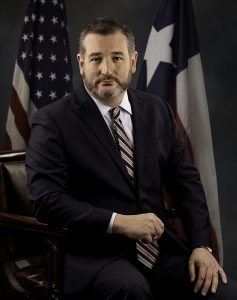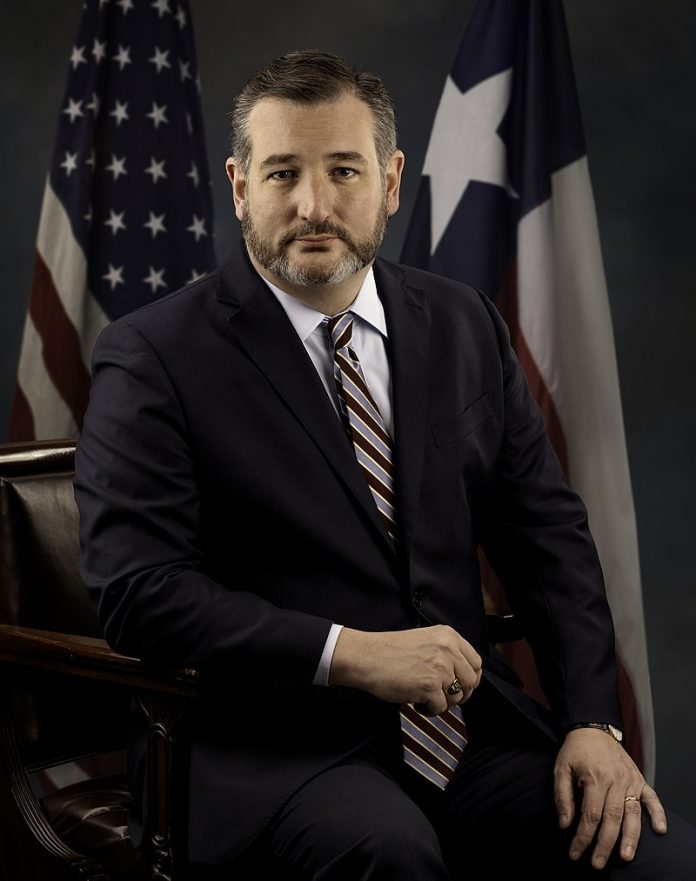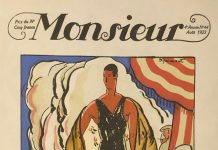As I have said before on this website, Shakespeare was right on everything about which he spoke, and he offered innumerable principles of wisdom for bettering the world. The wisest of these offerings is the following quote, “The first thing we do, let’s kill all the lawyers.” I, in my radicality, believe that we should kill not only the lawyers, but even those who think like lawyers, beginning from the very worst of them (which would be the nine injustices on the Supreme Court) to the very best. I confess though that Shakespeare’s view and my own are in the minority, so instead of killing lawyers, I must settle for reading and reviewing their books.
This latest book, One Vote Away, is written by the lawyer and senator Ted Cruz, whom I consider to be one of the five righteous lawyers left in all the earth. Perhaps if we ever find ten righteous lawyers, after the fashion of God, we could consider sparing the whole lot of them from death (though I personally don’t think we ever will find ten righteous lawyers). One Vote Away is about the Supreme Court and the rights which are going up in flames or shall go up in flames if we have the misfortune of seeing one more judicial activist appointed to that sacred but oft-defiled institution (I suggest that if we set the Supreme Court injustices up in flames, we would see less of our rights going that way).
In that vein, the book considers eight primary constitutional freedoms which have often come before SCOTUS, and just as often been preserved or denied by a single vote. The “Supreme Court has become the preeminent arbiter of our constitutional rights. And the type of justice who serves has a profound impact on public policy and our fundamental liberties.” Not coincidentally, many of the studied court cases (each chapter focusing primarily on one major court case) are ones which Mr. Cruz himself helped litigate. For this review, I choose to focus on the rights of Free Speech and Free Elections, which, after this 2020 election, seem beyond all others tentative at best, and both of which will take significant attacks when Mr. Joseph Biden assumes the role of President of the Unites States. Mr. Cruz chooses to revolve the question of Free Speech (ch. 6) around the court case Citizens United v. Federal Election Commission. The case was rather simple, even if it was significant: Citizens United, a non-profit organization which made a movie critical of Hillary Clinton, marketed the movie immediately preceding a federal election. The Federal Election Commission attempted to fine Citizens United according to the “McCain—Fiendgold campaign finance legislation”, which is when Citizens United sued in court challenging such an action as unconstitutional. “Ultimately, the Supreme Court struck down the provisions of McCain—Fiengold that purported to restrict Citizens United’s ability to publish. . . .its movie criticizing Hillary Clinton”.
That is not the most fascinating aspect of the chapter, nor the most frightening. In 2013, in response to the Citizens United ruling, fifteen Senate democrats introduced “a constitutional amendment” to repeal the first amendment. “The. . . .proposed amendment gave Congress plenary authority. . . .to regulate any expenditure of funds by any American to influence an election.” So much for little Biden or Trump signs in your yard or wearing advocative t-shirts. The Dems eventually tossed that one and introduced an amendment to regulate corporations’ political speech (which is just as communistic because a corporation is simply a group of people, just as the American people is a group of people). CNN and MSNBC are corporations too (just think, the government could fine Jim Acosta for saying “Donald Trump lied again in saying that his golf course is the best in the world” or “Trump’s a big meanie with his tweets and his language is far to crude for the oval office”). The Dems saved face on that by adding a little note to the amendment that said their communistic amendment was not meant to abridge freedom of the press. After all, they thought the government should only have the right to ban books and jail executives for producing incorrect movies and fine the Sierra Club for advocating for certain candidates, but they certainly didn’t believe government should be so intrusive as to regulate Anderson Cooper’s perspective on things.
Mr. Cruz introduced an amendment to the amendment of the Democrats which was word for word the first amendment. Every single democrat on the Senate Judiciary Committee voted against it. I know you don’t believe me, so I will kindly say it again: every single Democrat voted to reject the first amendment. Eventually, the Democrat amendment went to the whole senate: every single Democrat voted to grant government the authority to “burn books” and ban movies and jail its political enemies. Hillary Clinton had pledged to appoint only justices (if she became Madame President) who would repeal Citizens United and thereby grant the government communistic authority over information and consumption of information; since Mr. Biden is even more “progressive” than Madame Clinton, we can be assured Mr. Biden would appoint similar justices. The final vote count for Citizens United, on whether the government possessed authoritarian powers to regulate consumption of information: 5/4.
This trend of revoking Constitutional rights finds rich soil in the pure enlightenment and leftist idea that governance (in all its inflections: legal, legislative, executive) is a profession, and therefore the right to govern is not merely or primarily conferred by the consent of the governed, but by the expertise attained by being a so-called “professional politician”. Just as the right to diagnose people with cancer is not conferred by consent of the patient, but rather by medical expertise, so the right to govern is not conferred by the consent of the people, but by the expertise of politics which being a professional legislator or lawyer or executor confers. After all, to stretch the doctor metaphor even more, one goes to a doctor to get medical advice because a layman is “incompetent” to diagnose and treat themselves, at least in advanced medical situations; so too, an average American is largely incompetent to govern himself, so he must rely on experts to govern him instead. (Donald Trump was the very antithesis of professional politics; I think you can gather what I think of this).
Now we shall pivot to election integrity and Bush v. Gore, which is an even more relevant topic than free speech, at least at the present moment. The media had called the election for Gore on election night but then retracted it and called it for Bush (many people will be surprised to learn that it is indeed not CNN or Fox News who determine the President-elect, despite the way they have behaved over the past month). The contested area of Bush v. Gore was small, a mere several counties. The particular interest of this chapter for a reader after this election is not necessarily the details of the Bush v. Gore case, but the exact spirit behind the legal arguments that were used then and are being used now. The initial argument of the Bush case was “that federal law categorically prohibited Florida from changing its election law on certification”—rather similar (in philosophy) to the legal argument proposed by the Trump team that Pennsylvania’s supreme court is prohibited by Constitutional law from changing the “time” and “date” criteria for ballots, for as the constitution says, only the Congress may set the time, date, and circumstances of election and ballot qualifications. Then there was the controversy over the “hanging chads”, the chads on punch cards in election machines. There were “swinging chads” and “pregnant chads” and every sort of chads the democrats needed to get Al Gore across the finish line. The state trial court ruled against the Bush team, ordering that “each county could conduct the recount any way it liked and use whichever standards it wanted”. In other words, each county could count “over-votes and under-votes” in order to benefit the candidate that county favored. “Then, all of these outcomes would be tallied to achieve a different statewide vote total.” The Bush team argued that violated the Equal Protection Clause, which is another issue in litigation for the Trump team (in areas strongly Republican, in certain parts of the country, there were vote drop-boxes every 72 miles while in strongly Democrat areas there were vote drop-boxes every four miles).
Of course, the outcome of this case is known: SCOTUS finally voted majority to disallow Gore’s continuing challenges. The vote count: 5/4. Now, these are a mere two chapters: there are five others on the second amendment, criminal justice, etc. This book is a convenient one for law students and historians of law. It is jampacked with interesting legal tidbits (did you know that the famous legal words “You have a right to remain silent. Anything you say can and will be used against you” are a direct result of judicial activism in the case Miranda v. Arizona. Such protections for criminals under the law never really existed). Above all though, this book is also a very good one for those who would like to add more reasons to their list for hating lawyers. Except for Mr. Cruz, who I think is a very good one.
Note added by the Managing Editor of Sun News Tucson:
Even though lawyers and politicians rarely tell the unvarnished truth, Sun News congratulates Mr. Cruz for telling that unvarnished truth once:
On May 3, 2016, he said publicly about Mr. Trump:
“He doesn’t know the difference between Truth and Lies. He lies practically every word that comes out of his mouth. The man cannot tell the truth, but he combines it with being a narcissist – a narcissist at a level I don’t think this country has ever seen.”
We do not contest the ability of Mr. Cruz as a lawyer. However, it must be noted that when Mr. Trump asked Mr. Cruz to argue his case for overturning the Federal Election (which is a violation of his oath of office, and brazen treason) before SCOTUS, the response from Mr. Cruz was effectively: “Ya vol, mein Fuhrer.” Sun New agrees with Shakespeare.
One Vote Away: How a Single Supreme Court Seat Can Change History, by Ted Cruz, is printed by Regnery Publishing.














